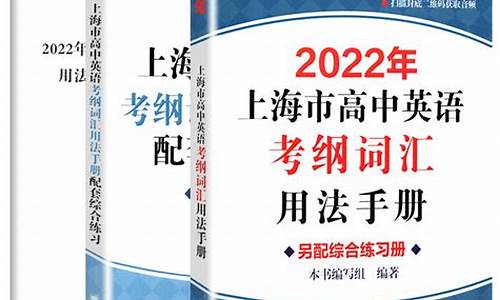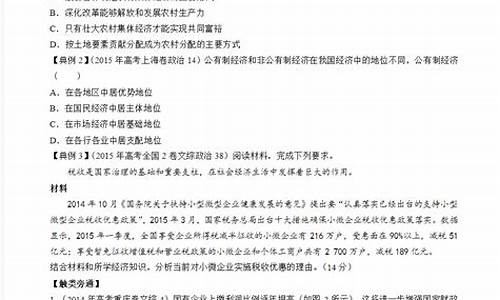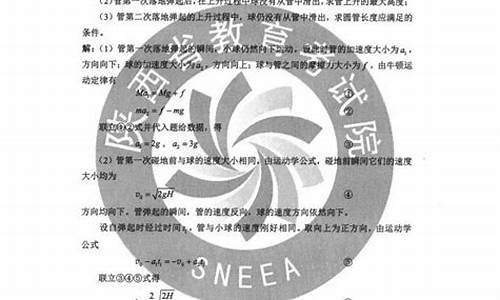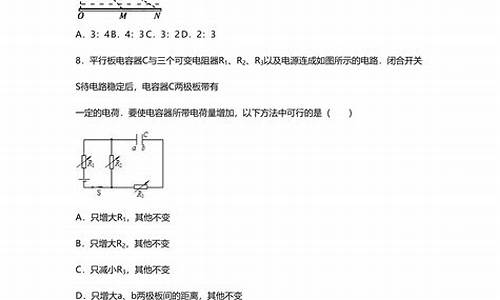您现在的位置是: 首页 > 教育改革 教育改革
英语高考考纲电子版_英语高考考纲
tamoadmin 2024-05-31 人已围观
简介1.2014陕西高考英语考纲词汇。带翻译2.高考英语大纲单词范围。3.如何复习成人高考英语上海市高中英语考纲词汇有6000个。上海高中英语课标中的明确要求高三学生达到30万的词汇阅读量,核心词汇是2000左右,尤其是核心词汇2000,这些核心词汇的名词、动词、形容词和副词之间的转换,基本达到6000以上词汇,这也就是为什么很多同学在高考中感觉好语篇阅读中的词超纲不认识的原因,事实上,这些超纲词大多
1.2014陕西高考英语考纲词汇。带翻译
2.高考英语大纲单词范围。
3.如何复习成人高考英语

上海市高中英语考纲词汇有6000个。上海高中英语课标中的明确要求高三学生达到30万的词汇阅读量,核心词汇是2000左右,尤其是核心词汇2000,这些核心词汇的名词、动词、形容词和副词之间的转换,基本达到6000以上词汇,这也就是为什么很多同学在高考中感觉好语篇阅读中的词超纲不认识的原因,事实上,这些超纲词大多是根据构成法进行考纲词汇变形的结果。
2014陕西高考英语考纲词汇。带翻译
1、听力(单项测试)(20分)。
2、阅读理解(包括五分之七的阅读)。
3、完形填空。
4、填入语法空白。
5、写作:实践写作。阅读后续写作或内容摘要。
“写作”重点考察考生理解和呈现原文要点的能力,以及准确运用词汇和语法结构的能力。要求学生客观、简洁地概括原文,确保故事完整、连贯、合乎逻辑。
2021高考英语新趋势
①不影响对文章整体意思理解的超纲名词不再给出注释,考纲词汇的派生词也有增多的趋势。如:demanding苛求的,要求高的;commercialize商业化;等等。
②试题所选文章语言地道、特点鲜明,突出对词类的活用。如,age常用作名词,表示“年龄”,全国卷Ⅰ七选五考查其动词用法,表示“使显老,使变老”。
③出现大量的地道短语和句式。如whispersupport(全国Ⅰ卷),off the hook for(全国Ⅱ卷)。
④2020年高考在语法考查方面,会更为趋向全面,考生在备考时要注意考点覆盖的广度,特别要关注2019年试题中未涉及的语法知识。
⑤词汇的考查更多地以整个句子为背景,释义包括精准的汉语释义、英语释义、熟词生义、搭配义等多个维度,精准理解话题词汇在具体语境和搭配中的语用意义。
高考英语大纲单词范围。
这是新增的词汇哦,还有原来的不要忘了!!!
1. abuse[?'bju:s] n.滥用 Much of the crime in this area is related to drug abuse.
[?bjuz]v. 滥用I'm afraid the position is open to abuse.
2. academy[?'k?d?m?] n. 专科学校;学会,学院He passed into the Military Academy with no difficulty.
3. adequate [?d?kw?t] adj. 足够的;适当的Wear clothes that provide adequate protection against the wind and rain.
4. adolescent[?d?lesnt] n. 少年adj. 青春期的The adolescent period is one's best time.
5. advocate ['?dv?ke?t] vt. 提倡We advocate solving international dispute by negotiation, instead of appealing to arms. 我们主张通过协商解决国际争端,而不主张诉诸武力。
6. agency ['e?d?ns?] n. 代理;机构He was placed in Xin Hua News Agency as a translator. 他被安排在新华通讯社当翻译。
7. aggressive [?gres?v] You'd better keep the two aggressive boys apart. 你最好把那两个好斗的男孩分开。
8. amateur n. 业余爱好者 adj. 业余的Although Tom's only an amateur he's a first-class player. 虽然汤姆只是个业余爱好者,但却是一流的高手。
9. ambiguous[?m?b?gju?s] adj. 含糊的This sentence is ambiguous in sense. 这个句子意思不清楚。
10. apparent [?'p?r?nt] adj. 易看见的It was apparent from her face that she was really upset. 从面容上一眼就可以看出她确实心绪烦乱。
11. applaud [?'pl?:d] vt. 鼓掌欢迎vi.鼓掌The audience laughed and applauded
12. applicant [?pl?k?nt] n. 申请人This applicant is by far the better than that one.
13. architect [?ɑ:k?tekt] n. 建筑师. The new building was built from the design of a famous architect.
14. assume [?'sju:m] vt.假设It is reasonable to assume that he knew beforehand that this would happen. 有理由认为他事先就知道会发生这样的事。
15. authentic [?:?θent?k] adj. 真的,真正的This is an authentic news report. We can depend on it.
16. awesome ['?:s?m] adj. 令人敬畏的;可怕的They had an awesome task ahead.
17. bachelor ['b?t?l?] n. 学士;单身汉Distrusting women, he remained a bachelor all his life.
18. balcony ['b?lk?n?] n. 阳台There were tubs of flowers on the balcony.
19. biochemistry [?ba'kem?str?] n. 生物化学
20. bonus ['b?n?s] n. 奖金,额外津贴;红利. The workers expected to share out a year-end bonus. 工人们期望年终分红。
21. boom [bu:m] n.繁荣 The country is having a great boom in industry.
22. bound [ba?nd] adj. 必然会Pete, ever the optimist, said things were bound to improve. 一向乐观的皮特说,事情必定是会好转的。
23. boundary ['ba?ndr?] n. 分界线 A river forms the boundary between the two countries.
24. brunch [br?nt?] n. 早午餐 They eat much the same thing for brunch every day. 每天早午餐他们总是吃同样的东西。
25. bunch [b?nt?] n. 束,串She picked a large bunch of flowers for table decoration. 她采了一大捧花来装饰桌子。
26. capsule n. ['k?psju:l] 胶囊;航天舱The doctor advised me to take a capsule this morning.
27. cast [kɑ:st] vt. 铸造;投掷She cast a welcoming smile in his direction. 她向他微笑以示欢迎。
28. category [?k?t?g?ri] n. 类型,种类These questions may be included in the same category. 这些问题可以归入一类。
29. catholic [?k?θl?k] adj.天主教的
30. chef [?ef] n. 厨师No one can become a chef without practical experience.
31. commit [k?'m?t] vt. 犯罪;把…托付给I have never committed any crime... 我从来没犯过罪。
32. compass ['k?mp?s] n. 罗盘;指南针The invention of the compass was referred to China. 指南针是中国发明的。
33. compromise ['k?mpr?ma?z] vi. 折中解决;妥协The spokesman made it evident that no compromise was yet in sight. 发言人表示,目前还不会妥协。
34. confidential [?k?nf?'den?l] adj. 秘密的He refused to allow his secretary to handle confidential letters. 他不让秘书处理机密文件。
35. consequence [?k?nsikw?ns] n. 结果 The consequence was that he caught a bad cold. 结果是他得了重感冒。
36. conservative [k?n?s?:v?t?v] adj. 保守的 Politically, they belonged to the conservative party and opposed reform. 在政治上,他们是保守派,反对改革。
37. consistent [k?n?s?st?nt] adj. 一致的 His action is always consistent with his words. 他始终言行一致。
38. consult [k?n's?lt] vi. 商议vt. 请教 If you have no idea about it, consult a dictionary, please. 要是你对这个问题不清楚,请你查字典得了。
39. contradict [?k?ntr?'d?kt] vt. 反驳Young children should never contradict what their parents say. 孩子们绝对不应顶撞父母。
40. convey [k?n've?] vt. 传达 Don't forget to convey my regards when you see him. 你去见着他,别忘了给我捎个好儿。
41. criterion [kra?'t?r?n] (pl criteria) n. (批评、判断等的)标准 Only social practice can be the criterion of truth. 只有社会实践才能是检验真理的唯一标准。
42. cuisine [kw?zi:n] n. 烹饪,烹调法The hotel has a large dining room serving superb local cuisine. 饭店有一个大餐厅供应上好的当地菜肴。
43. damp [d?mp] adj. 微湿的
44. departure [d?pɑ:t?(r)] n. 离开 Do you know what lies behind her sudden departure for London? 你知道她突然去伦敦的原因吗?
45. desperate [?desp?r?t] adj. 绝望的;铤而走险的They made a desperate attempt to save the company. 他们为挽救公司作孤注一掷的努力。
46. detective [d?tekt?v] n. 侦探
47. distinction [d?st?k?n] n. 区别 We must draw a clear distinction between right and wrong. 我们必须明确区分是与非。
48. draft [drɑ:ft] vt. 起草 n.草稿 I know that this draft text will need to be edited.
49. electronic [?lek'tr?n?k] adj. 电子的 It is an electronic device with many uses. 这是一部具有多种用途的电子仪器。
50.enquiry [?n'kwa?r?] n. 询问 The enquiry must be independently conducted. 这次调查必须独立进行。
51. evident [?ev?d?nt] adj. 明显的 It has now become evident to us that a mistake has been made. 我们已经清楚出了差错。
52. expose [?k'sp?z] vt. 揭露;使暴露 We must expose this shameful activity to the newspapers. 我们一定要向报社揭露这一无耻行径。
53. extraordinary [?k?str?dnri] adj. 非凡的,特别的 She has a marvellous voice with an extraordinary range. 她歌喉甜美,音域奇广。
54. fantasy ['f?nt?s?] n. 幻想;空想的产物
55. flashlight ['fl?la?t] n. 手电筒I saw the sudden flare of a flashlight in the darkness. 我看到手电筒在黑暗中突然闪出的亮光。
56. fortnight [?f?:tna?t] n. 两星期 You need a break. Why not take a fortnight off from work? 你需要休息,为什么不休假两周呢?
57. freeway ['fri:we?] n. 高速公路
58. gallery ['ɡ?l?r?] n. 画廊 A number of priceless works of art were stolen from the gallery. 美术馆中许多价值连城的艺术品被盗。
59. grand [ɡr?nd] adj. 宏大的 My hospital room was like Grand Central Station with everybody coming and going. 我的病房就像纽约的中央火车站,整天人来人往。
60. holy ['h?l?] adj. 神圣的 A holy person is required to read the Holy Bible. 圣徒必读《圣经》。
61. hydrogen [?ha?dr?d?n] n. <化>氢
62. identify [a?'dent?fa?] vt. 识别 Would you be able to identify the man who robbed you? 你能够认出那个抢你东西的人吗?
63. immigration [?m?gre?n] n. 移民;移居 A considerable number of people object to the government's attitude to immigration. 相当多的人反对政府对待移民问题的态度。
64. librarian [la?'bre?r?n] n. 图书管理员 The librarian entered a new book in the catalogue. 图书管理员把一本新书编入目录。
65. lid [l?d] n. 盖子I can't get this lid off—It'seems to be nailed down. 我打不开这个盖子,好像是被钉住了。
66. mourn [m?:n] vi. 哀痛 vt. 表示深深的遗憾
67. offensive [?fens?v] adj. 无礼的
68. plug [pl?ɡ] vt.& vi. 插上插头n. 塞子;插头 Check that the plug has not come loose . 检查一下别让插头松脱了。
69.portable [?p?:t?bl] adj. 手提的 I have a portable typewriter.
70. psychology [sa?'k?l?d?] n. 心理学
71. qualification [?kw?l?f?'ke?n] n. 资格 Jack has obtained a medical qualification. 杰克取得了行医资格证书。
72. random ['r?nd?m] adj. 任意的;随机的n. 随意 The interviews were given to a random sample of students. 随机抽选出部分学生进行了采访。
73. receipt [r?'si:t] n. 收据 After she paid the bill, she placed the receipt in her wallet. 她付了款之后把收据放进皮夹子里。
74. receptionist [r?sep?n?st] n. 接待员 Ask the receptionist to put your call through to my room. 让接待员把你的电话接到我房间。
75. reservation [?rez?'ve?n] n. 保留 I'll call the restaurant and make a reservation . 我要给饭店打个电话预订座位。
76. resign [r?'za?n] vt.& vi. 辞职,放弃
77. sacrifice ['s?kr?fa?s] n. 牺牲vt.& vi. 牺牲 He decided to sacrifice a trip for a new house. 为了购买新房子,他决定放弃旅行。
78. self [self]
79. sideway ['sa?dwe?] n.人行道
80. sleeve [sli:v] n.袖子
81. spiritual [?sp?r?t?u?l] adj. 精神的 People need a chance to reflect on spiritual matters in solitude. 人们需要独处的机会来反思精神上的事情。
82. stainless ['ste?nl?s] adj. 不锈的 I have a set of stainless knives and forks.
83. steep [sti:p] adj. 陡峭的 The slope is too steep for us to climb. 这斜坡太陡,我们爬不上去。
84. strawberry ['str?:b?r?] n. 草莓I only had a strawberry yoghurt for breakfast. 我早餐只吃一个草莓酸奶。
85. substitute ['s?bst?tju:t] vt.& vi. 代替n. 代替者Second again, we shouldn't substitute our 86. personal feeling for policies. 其次,我们不应该拿个人感情代替政策。
87. vacant [?ve?k?nt] adj. 空闲的Vacant positions can be made known through the medium of the press. 职位空缺可假托报纸公布于众。
88. valid ['v?l?d] adj. 有效的 Illness is a valid excuse for being absent from work. 生病是不去上班的正当理由。
89. visual ['vl] adj. 视觉的 I have a very good visual memory. 我过目不忘。
90. worm [w?:m] n. 虫,蠕虫
91. factor ['f?kt?(r)] n. 因素
92. negative ['neɡ?t?v] adj. 消极的
93. complain [k?m'ple?n] vi. 抱怨
94. complaint [k?m?ple?nt] n. 抱怨
95. detail [?di:te?l] n. 详述
96. solution [s?lu:?n] n. 解决;溶解
97. solve [s?lv] vt. 解决
98. involve [?n'v?lv] vt. 包含;使参与,牵涉
99. ideal [a?'di:?l] adj. 理想的n. 理想
101. narrator [n?re?t?(r)] n. (故事的)讲述者
102. neutral [?nju:tr?l] adj. 中立的
103. affirmative [?f?:m?t?v] adj. 肯定的;赞成的
104. economy [?'k?n?m?] n. 节约;经济
105. attentive [?tent?v] adj. 注意的
希望对你有所帮助哦!!!加油~~~
希望这个对你也有帮助!!!
如何复习成人高考英语
单词说实话,大部分只要会认,但是有词组的单词一定要会背,还要会背他的词组
高考英语考试的重点其实并不是你英语水平有多高,也不是你单词背了多少,其实高考英语考来考去也就是高一至高二上学期的那些单词,考察的词汇量其实不大,但是大家还是考不好,不懂你有没有想过为什么。其实高考延续数十年的习惯,还是把考试的重点放在词汇的应用上。英语有它的特殊性,就是常用词可以搭配的词组非常多,所以高考英语要有所突破的好方法,就是多背词组,最好2000个常用词,都到《牛津英汉双解高阶词典》里把词组都查出来。虽然很花时间,但是只要做了,考到130以上肯定没问题,如果是把词组百分百的整理出来,那几乎就可以考满分。因为英语考试的出卷人,也是边查《牛津英汉双解高阶词典》,边出卷的。他们水平再高,也不敢出这个字典里查不到的东西。
当然也有更轻松的方法,前人肯定有人做过这个事,把他们的成果直接拿来用就可以了,
淘宝搜“高考英语笔记 永安纤城中学 高分145”
就可以找到个英语状元的笔记,我拿来看过,非常完整,居然整理出了高中所有的词组一万五千多个,我拿来给自己的学生用,进步神速,去年高考班上就出了好几个135分以上的学生。整份笔记 72面 纯手写影印,人家3年高中总结的资料只要106元,比两三次英语家教还便宜,效果却比家教上课好得多。
所以比起有的老师要求背课文,我更推荐这个,背词组才是英语高考应试的最终法则。
准备参加成人高考的考生复习备考,首先要认真研读成人高考英语考纲。成人高考英语考纲是指教育部颁发的《全国各类成人高等学校招生复习考试大纲》。该考试大纲除了对成人英语高考给出必考内容和范围,对各种必考题型作出解释以外,还给出了基础英语语法知识考点83个,附上了成人高考英语科考试的全部必考词汇,共1795个(另有专业英语词汇201个),全部必考短语,共593个(另有专业英语短语29个)。成人高考考纲也是成人英语高考命题的主要依据。 I.词汇知识 1.在成人词汇知识命题中,词汇与短语的比例约为11∶1.加强对单词的记忆。能否清晰、准确地记忆成人高考必考词汇的词意及其词性是能否成功作答该题型的关键。 2.重视选用词意较为生僻或使用率偏低的词汇命题,如:suspected,concluded,announced,astonished,tough,rough,reducingurged,instantly,constain,recommended,somehow,imagination,inspects,possess. 3.在成人高考必考1970词中,部分词汇由于教材等种种原因使用率较高,如:majority,thorough,pour,beyond,ceiling,coast,envy,frequently,mass,modest,port,shortcoming,sleeve,thunder,wealth,trick,stocking,pressure,etc.词意较为生僻或使用率偏低的词汇,考生应注意对单词拼写记忆的牢固程度。 4.考生应有一定的对近义词不同搭配用法的常识,在有可能出现多个答案的情况下,对词的用法进行甄别。对最常用词汇的易混易错现象,如:①sit(坐),seat(就座)②borrow(借入),lend(借出)③bring(带来),take(带走),fetch(取)④thank(+人),appreciate(+事/物)⑤hanged(上吊),hung(挂)⑥rise(上升),raise(拾起)⑦especial(尤其的),special(特殊的)⑧accident(事故),incident(事件)⑨medal(奖章),model(模型) 10 accept(接受),receive(收到) 11 curious(好奇),surprised(吃惊) 12 cloth(布),clothes(衣服),clothing(衣物) 5.该题型要求考生能有一定的对词汇不同搭配用法的领悟能力,如:①theoperationofhisbusiness→thepunningofhisbusiness②agoodgraspoftheEnglishlanguage→agoodunderstandingoftheEnglishlanguage③Makingplansisnatural,buthowmanyoftheplanswearemakingtodaywillbecarriedout.→Makingplansisnatural,buthowmanyoftheplanswearemakingtodaywillberealized.④Keepafastholdofthehandlewhenyourunthemachine.→Keepafirmholdofthehandlewhenyourunthemachine. 6.易错常考的成人高考词汇用法(1)pulldown(thehouses)→destroy干扰项:①build②design③putaway「解析」pulldown指‘推倒’。(2)referto(thenotes)→lookat干扰项:①mention[DW>②take③payattentionto「解析」referto指‘参考’。(3)lookafter(thebaby)→takecareof干扰项:①care[DW>②see[DW>③watch「解析」lookafter指‘照料’。(4)intheend→atlast干扰项:①soon[DW>②atleast[DW>③afterwards「解析」intheend指‘最后’。 II.语音知识 1.重视对元音读音规则的考查。(A)①A.cowB.growC.throwD.show(D)②A.similarB.singleC.signalD.silence(D)③A.clearB.spearC.fearD.bear 2.重视对辅音读音规则的考查。(B)①A.material[DW>B.patient\=[DW>C.instant[DW>D.active(D)②A.childB.cheer\=C.choiceD.character 3.重视对音的同化现象的考查。(A)①A.businessB.Christmas\=C.basketD.constant(B)②A.playedB.wanted\=C.changedD.bordered4.重视对词在变形后产生新的读音变化的考查。(B)①A.wonB.none\=C.goneD.done5.重视对双音节词的读音规则的考查。(C)①A.dollarB.honest\=C.politeD.pocket提示:选项A、B、D的划线部分均为重读音节,而选项C的划线部分均为弱读音节。元音在弱读音节中常发[ ]音。掌握这一特点,则有助于解题。 III.语法知识 1.重视从时态一致的角度考查:①Thedog[ZZ(Z>(D)[ZZ)>inaterribleconditionwhenwefoundit.A.isB.hasbeenC.wouldD.was 2.重视从语境对话的角度考查动词。①枣HaveyouheardthenewsaboutTom?枣No,what(D)?A.wasitB.weretheyC.aretheyD.isit 3.重视对非谓语动词的考查。①Igotaletterfrommysister,(C)methatshewouldvisitusnextmonth.A.tellsB.toldC.tellingD.totell 4.重视对定语从句的考查。①Istillremembertheplace[ZZ(Z>(C)[ZZ)>ourclassoncedidsomefieldwork.A.there[DW>B.whichC.where[DW>D.when 5.重视对状语从句的考查。①(A)nonsensethepaperprints,somepeoplewouldbelieveit.A.Whatever[DW>B.WhatC.However[DW>D.HowⅣ。完成句子该题型为填充题。要求考生能根据每小题中所给的汉语提示,写出句子的短缺部分。通过对近年成人高考完成句子试题的分析,可以看出该题型重视对基础英语语法的测试。 如:1.Allthemoney(他省下来的)wasgiventothevillageschoolforaclassroombuilding.「答案」(that)hesaved「解析」考查对定语从句的掌握。 2.(写作文时),hereferredtothedictionaryfromtimetotime. 「答案」When/While (hewas)writingacomposition「解析」考查对状语从句的掌握。 3.Thedoctorinsiststhat(我父亲戒烟)。「答案」myfather(should)giveupsmoking「解析」考查对虚拟语气的掌握。 Ⅴ.介绍几种实用的阅读理解解题技巧 a.先看问题,后看文章一般考生在进行阅读理解的过程中所采用的方法有二:第一种是先读文章再答题,另一种是先看问题,后读文章。如果你看过文章就完全记下内容,做题时不须再回头找答案,先看文章当然好。否则先看文章就比较费时间。请看A、B二者的比较:A.(1)读文章B.(1)看问题(2)看问题(2)看文章(3)回头看文章(3)选择答案(4)选择答案从A、B比较可知A须花四个步骤而B只要三个步骤,在时间上就简去了一项反复。此外,先看题目,在阅读时可采用重点式的读法,而A却是在完全没有目标的情况下阅读,反复是显而易见的。 b.不以阅读速度回行考生在阅读文字时由于理解的需要,通常速度较为缓慢,倘若一行结束后,用此速度回到下一行首,无形中会挤占部分宝贵的阅读时间。建议考生养成快速回行的习惯,即比阅读文字的速度快一倍左右迅速回行。这样做,一方面会节省不少时间,另一方面也会使思维活动加快,其好处是不言而喻的。 c.掌握问题类型有助于解题 A)客观型(Objective)问题客观问题也为客观信息题,指客观事实,其类型大都是用When/Who/Where/Why/What/Which等Wh及How的方式出题。像这类客观的问题有时不必细读文章,用略读的方法即能找到答案。考生还应对阅读材料中的数字,事实,物体,以及部分与整体的关系、时间关系、地点关系、并列和从属关系等给予注意。 B)主观型(Subjective)问题主观问题也为主观信息题,主观的问题通常不能直接从文章找到答案,必须经过对作者的意图,态度以及对整篇文章进行深一层的推断和判断才能回答。比如:找出文章的命名(Title),找出文章的主旨含义(MainIdea),找出结论(Conclusion),找出目的(Purpose),找出暗指,意味(Implication),找出推测(Inference),以及对作者本人作出判断等。 d.阅读理解导读(要求先自己做一遍,再对照答案,找出问题,并阅读“解析”,从而更有效地掌握阅读解题技巧。) The Great Fireof London started in the very early hoursof2September1666.Infourdaysitdestroyedmorethanthree quartersoftheoldcity,wheremostofthehouseswerewoodenandclosetogether.Onehundredthousandpeoplebecamehomeless,butonlyafewlosttheirlives.ThefirestartedonSundaymorninginthehouseoftheKing‘sbaker(面包师)inPuddingLane.Thebaker,withhiswifeandfamily,wasabletogetoutthroughawindowintheroof. Astrongwindblewthefirefromthebakery(面包房)intoasmallhotelnextdoor.ThenitspreadquicklyintoThamesStreet.Thatwasthebeginning.Byeighto’clockthreehundredhouseswereonfire.OnMondaynearlyakilometerofthecitywasburningalongtheRiverThames. Tuesdaywastheworstday.Thefiredestroyedmanywell knownbuildings,oldStPaul‘sandtheGuildhallamongthem.SamuelPepys,thefamouswriter,wroteaboutthefire.Peoplethrewtheirthingsintotheriver. Manypoorpeoplestayedintheirhousesuntilthelastmoment.Birdsfelloutoftheairbecauseoftheheat. ThefirestoppedonlywhentheKingfinallyorderedpeopletodestroyhundredsofbuildingsinthepathsofthefire. Withnothinglefttoburn,thefirebacameweakandfinallydiedout.Afterthefire,ChristopherWren,thearchitect(建筑师),wantedacitywithwiderstreetsandfinenewhousesofstone.Infact,thestreetsarestillnarrow,buthedidbuildmorethanfiftychurches,amongthemthenewSiPaul’s.Thefirecausedgreatpainandloss,butafteritLondonwasabetterplace:acityforthefutureandnotjustofthepast. 1.The fire beg an in A.ahotel. B.thepalace. C.PuddingLane.[DW> D.ThamesStreet. 2.The under lined word‘family’in the second paragraph means A.home.[DW> B.children. C.wifeandhusband.[DW> D.wifeandchildren. 3.ItseemsthatthewriterofthetextwasmostsorryforthefactthatA.somepeoplelosttheirlives. B.thebirdsintheskywerekilledbythefire.C.manyfamousbuildingsweredestroyed.D.theKing‘sbakerywasburneddown. 4.Whydidthewritercite(引用)SamuelPepys?A.BecausePepyswasamongthoseputtingoutthefire.B.BecausePepysalsowroteaboutthefire.C. Toshowthatpoorpeoplesufferedmost.D.Togivethereaderaclearerpictureofthefire. 5.Howwasthefireputoutaccordingtothetext?A.Thekingandhissoldierscametohelp.B.Allthewoodenhousesinthecityweredestroyed. C.Peoplemanagedtogetenoughwaterfromtheriver.D.Housesstandinginthedirectionofthefirewerepulleddown. 6.Whichofthefollowingwerereasonsfortherapidspreadofthebigfire?(a)Therewasastrongwind.(b)Thestreetswereverynarrow.(c)Manyhousesweremadeofwood.(d)Therewasnotenoughwaterinthecity.(e)Peopledidnotdiscoverthefireearlier.A.(a)and(b)B.(a),(b)and(c)C.(a),(b),(c)and(d)D.(a),(b),(c),(d)and(e) 「解析」 1.问Where.属客观类问题。答案可由第二段第一句得出。 2.family指children.此题考查对family一词的理解,属客观类问题。此题也可采用排除法。原文中Thebaker,withhiswifeandfamily,…wife与family并列,family不包括wife在内,而home一词指家庭,包括家中所有人在内,也不对。 3.此题为推断题,属主观类问题。作者的思想感情并未通过文字直接表述出来。但通过第三段“Tuesdaywastheworstday.Thefiredestroyedmanywell knownbuildings…”可得出本题答案。火灾造成任何损失都是坏事,而“theworst”是糟糕的,也就是最令人遗憾的。 4.综合第四段所引用的内容,可看出第四段承接前三段,进一步描写人和动物在火灾中的情形。此题考查学生对段落与全篇的关系的理解,由此推断出作者的意图。属主观类问题。 5.此类题是就对文中的某一词语或句子的理解进行考查,一般形式有词语替换、习语释意、句型转换、语态互换、同义转换等。测试的字或句往往是学生没有见过的。解题时,应在理解题意的基础上,从文中找出相关的字句,根据语言环境,正确理解其含意,从而选出正确答案。本题答案可从第五段得出。短文中…todestroyhundredsofbuildingsinthepathsofthefire.与选项D为释义关系。 6.通过第一段“wheremostofthehouseswerewoodenandclosetogether”第二段“Astrongwindblewthefire”,和第六段“wantedacitywithwiderstreets…”“thestreetsarestillnarrow”可得出本题答案。属客观类问题。同时应注意的是引号内的内容是教科书上的范例,用以说明如何读药物使用说明的。「答案」1.C2.B3.C4.D5.D6.BⅥ。完形填空的答题与解题这类试题要求考生在掌握应有的语法、词汇知识和常识的基础上,善于寻找信息词,作出综合判断。补足后的短文应该意思通顺,结构完整。 做这类试题的方法是: 1.首先通读全文,对整个文章的内容要有个基本的了解。这是因为填写的答案虽是简单的词或短语,但词或短语的正确使用离不开句子,而句子又离不开整段的语言环境。对语言环境的熟悉有助于理解和把握解题的思路。 2.在此基础上,对试题所测试的部分进行初步估计,根据上下文的内容进行判断,选择适合上下文意思的词,同时应重点观察词的搭配用法,时态或动词的其它形态的用法,形容词的比较用法,代词的用法,名词的数、格的用法等。 3.如遇难填的空,可暂时跳过,待填完其他空白后,再回过头来做前面的难题,在全文已清楚的情况下,剩下的难题则有可能迎刃而解。4.这种试题要求做完之后再从头至尾通读一遍。根据短文的背景、上下文的意思,按时间顺序、情节发展、词类选用,动词变化、句子结构、短语搭配,以及运用必要的逻辑推理常识等,对选定的词再做一次综合分析,这显然是必要的。成人高考完形填空练习,请朋友们参阅复习教材,在老师的指导下加强练习,这里不一一例举。本文转载链接:|更多









